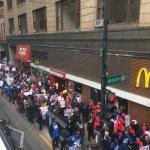Low Wage Workers: 'We Can’t Breathe'

As powerful protests of the New York Eric Garner grand jury decision – We can’t breathe – swept across the country, low wage fast food and retail workers walked off their jobs in some 180 cities, demanding a living wage and the right to organize. People are stirring, no longer willing to put up with an economic and political order that gives them no way to breathe.
The Garner demonstrators are not looking for a technical fix – putting cameras on police, retraining them, de-militarizing them. They are demanding justice. The police who killed Eric Garner were on camera. New York already outlaws police choke holds. To let the police walk without charges, the grand jurors had to ignore their own eyes and the law. They had to decide that Garner’s death, though tragic, was just collateral damage in the struggle to defend order, simply a cost of occupying neighborhoods scarred by poverty, racial isolation, mass unemployment, lousy schools and mean streets. The protesters understand that verdict leaves millions with no way to breathe.
The fast food and retail workers are also protesting injustice – an economic order in which they have no way to breathe. Their stories are heart-rending. They work for years at a minimum wage that forces them to rely on taxpayer subsidies for food and medical treatment. They are forced into part-time work with no routine schedules, making it impossible to do the planning needed to raise a child or hold the two or three jobs needed to support a family. They lose hours and lose their apartments. Their children live on edge of desperation. Any attempts to organize are crushed. They are disposables in multi-billion dollar chains where CEOs are paid – as the CEOS of McDonalds and Starbucks are paid — $9200 an hour. They cannot breathe.
In Washington, D.C., workers for the largest low wage employer – the federal government – led the demonstrations. Last year, their protests pushed the president to issue an executive order raising the minimum wages of contract employees to $10.10 (an order yet to be executed). But the minimum isn’t enough. Workers are demonstrating for an order that will give preference in government procurement to companies that pay a living wage of $15.00 or more to their workers, provide decent benefits, and allow their workers to organize and bargain collectively. Government should put its thumb on scale on the side of good employers and their workers, not favor exploitative employers like WalMart that pay so little that taxpayers have to pick up some of the bill.
These demands are gaining force. Voters in red states like Alaska, Arkansas, Nebraska and South Dakota approved initiatives to raise the minimum wage, even as they voted Republicans into office. Seattle has passed a $15.00 minimum wage; San Francisco is requiring companies to give workers advanced schedules. Up for re-election, the New Dem Mayor of Chicago, Rahm Emanuel, has suddenly thrown his weight behind a $13.00 minimum wage there.
Opinion research by Greenberg, Quinlan at the time of the election reveals that over three fourths of Americans – including a striking 60% of self-described conservative Republicans – favor the government giving preference to businesses that pay their employees a living wage and provide benefits such as health care and sick leave.
Leading the rally in DC was Senator Bernie Sanders, now mulling over a candidacy for the presidency in 2016. As CAF’s Richard Long reported, Sanders made it clear he would be prepared to stand with striking workers, to walk the walk, not simply talk the talk.
“We are living,” Sanders warned, “in a country where the middle class is disappearing, and where the people on top have never had it so good. We are saying today to the head of McDonald’s …that that the wealthy cannot have it all,” and “to the president… that the federal government “cannot [continue to] be the largest employer of low wage workers in this country.”
Sanders’ presence on the picket line — joined by the co-chair of the Congressional Progressive Caucus Keith Ellison and DC delegate Eleanor Holmes Norton — suggests that presidential and other political candidates in 2016 will have to decide just where they stand. Will they join workers in their calls for decent wages and walk the walk? Or will they stay aloof and ignore the growing movement?
When people move, smart politicians listen. The demonstrations across the nation after Ferguson and Garner, the growing protests of low wage workers risking jobs because they simply can’t breathe suggest that people are starting to move. The question soon will be who stands with those in motion and who stands with a status quo that clearly cannot hold.
